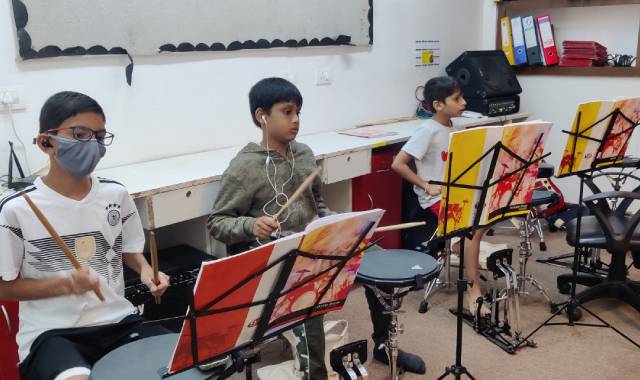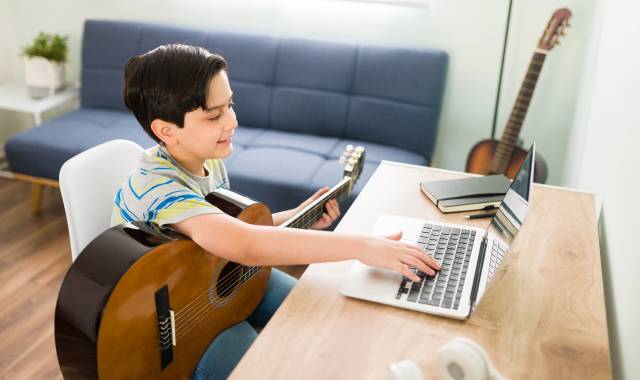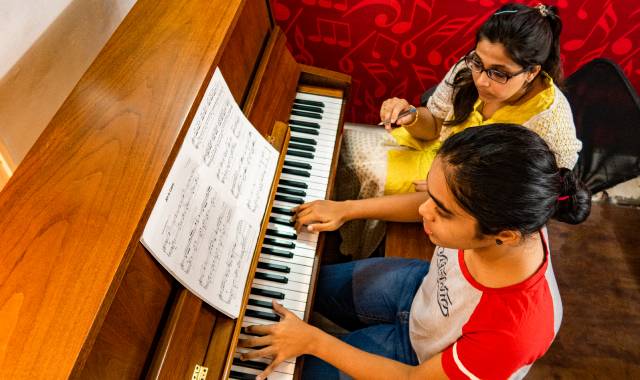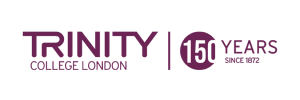Piano Lessons: Unlock Your Musical Potential
The magic of this Renaissance instrument transcends time and space, captivating audiences with its timeless beauty and enchanting melodies. Try to imagine L.V. Beethoven creating the Moonlight Sonata or J.S. Bach composing St. Matthew’s Passion! Experience the beauty of timeless music by learning to play the piano at our piano school. Our piano class is designed for complete beginners and explores the full emotional spectrum of music, from solemn and spiritual pieces to joyful and playful melodies.
Touted as one of the most played instruments in the world, you're sure to swoon in tantalizing symphony played on the instrument. Once you receive a certificate from us, know that your fingers are now fluent like the graceful flow of melodious stream.
Experience the joy of learning the piano with our diverse mix of music experts who bring a wealth of knowledge and expertise to shape your creative instincts. We offer world-class lessons on the piano for beginner and advanced levels following our carefully crafted internationally benchmarked piano course curriculum.
Learn at your own pace at our offline music centers located across India or you can bring home the music with our online piano courses. Our accessible online resources create an inviting and encouraging space for your musical development - thanks to our frequent assessments and performance opportunities that help in tracking and optimizing your progress at every stage!
Come, join us at FSM, and you will soon be singing the praises of your newfound piano skills.
India’s Leading Music School
In our piano classes for beginners students would be taught the basics of staff notations on the Treble clef and Bass clef. They will get to learn the basic scales and their application on the instrument with a 2-handed accompaniment. Our piano classes will train students to learn about dynamics, articulation, and accidental notes. Students shall learn Music Theory concepts along with songs.
Course Walk Through
- In our piano classes online and offline, students will develop a basic understanding of staff notations on the Treble clef and Bass clef
- They will learn basic scales and their applications on the instrument with a 2-handed accompaniment
- They shall engage in music workshops and stage performances to build stage confidence
Objective of the Course
- In our engaging curriculum students will achieve a sound knowledge of key notes.
- They will learn about the fundamentals of Layout of the Piano, Finger numbers, Note values: Whole notes, Half notes, and more.
The above-mentioned details are for beginner levels. We do provide courses for intermediate and advanced levels up to grade 8. All our courses are internationally benchmarked and accredited by the institutes like The Trinity College of London.
Basics of Music
Student will be able to perform following topics
Benefits of the Course
Session 24
-
 Techniques
Techniques
C pentascale, Play Loud & soft dynamics, Simple Pattern exercise -
 Repertoires
Repertoires
Units 1-4 Book B, Nursery rhyme-like pieces: Tooth Fairy, Hush Little Baby -
 Books
Books
Faber My First Piano Adventures Book B, FSM Piano Suite 1, FSM Theory Book 1 -
 Concepts
Concepts
Posture, hand position, finger numbers, C Pentascale, middle C position, Grand staff, Steps on staff, 4 notes above and below middle C read through Grand staff, Note values of Minim, Crotchet, Semibreve, Dotted half note -
 Sight Reading
Sight Reading
Steps on staff, identify notes from Bass Clef F to Treble Clef G, read basic rhythms in 4/4 -
 Aural Awareness
Aural Awareness
Recognise difference between Forte & piano, recognise difference between high and low pitch -
 Milestones
Milestones
FSM Assessment, Showcase performance, Recitals
Session 48 Most Popular
-
 Techniques
Techniques
Single & double notes, cross over, change in octave -
 Repertoires
Repertoires
Complete about unit 6-8. Pieces like Scotland Bells, Alouette, and Twinkle Twinkle (with main melody and 2 variations) -
 Books
Books
Faber My First Piano Adventures Book B, FSM Piano Suite 1, FSM Theory Book 1 -
 Concepts
Concepts
Octaves, More combination of pitch and rhythm covered from earlier units, Double notes, Time signature of 3/4, C scale -
 Sight Reading
Sight Reading
Recognise pentascale notes from C, Recognise one octave notes for bass clef -
 Aural Awareness
Aural Awareness
Recognise difference between Forte & piano, recognise difference between high and low pitch -
 Milestones
Milestones
FSM Assessment, FSM Internal Exam, FSM International Exam, Trinity/Rock-n-Pop Exam, Showcase performance, Recitals
Session 96
-
 Repertoires
Repertoires
Complete Faber My First Piano Adventures Book B, Achieve one unit or Performance piece from any of the following Book (per student's strength): FSM Piano Suite 2, Faber Piano Lessonbook Level 1, FSM Theory Book 1 & Book 2 -
 Books
Books
Complete Faber My First Piano Adventures Book B, Achieve one unit or Performance piece from any of the following Book (per student's strength): FSM Piano Suite 2, Faber Piano Lessonbook Level 1, FSM Theory Book 1 & Book 2
Begin Your Journey Now
India’s Leading Music School
0+
in-schools programs
0+
cities
0+
happy students
0+
professional teachers





